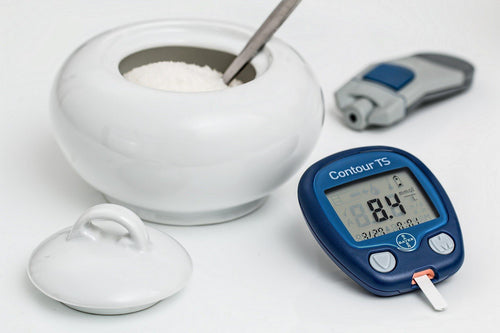No products in the cart.
"![]() We know that diabetes can lead to serious complications because of elevated blood glucose levels. We don’t, however, have to be diagnosed with diabetes to be exposed to the negative effects of elevated blood glucose. What is called protein glycation and formation of advanced glycation end products play an an important role in diabetic complications like retinopathy, nephropathy, neuropathy and cardiomyopathy and also other diseases like rheumatoid arthritis, osteoporosis, and aging (Singh VP, et.al., 2014). Glycation of proteins takes place when glucose reacts with proteins because it is causing damage. Advanced glycation end products, is formed when we have high blood glucose levels and is causing inflammation and endothelial damage (de Vries MA, et.al., 2014). The endothelium is the inner layer of the blood vessel wall. Eating food with a high glycemic index leads to the quick and high elevation of your blood glucose. This results in acute inflammation causing endothelial dysfunction which may be one of the earliest events forming atherosclerosis. Processed food, bread, cookies, candy, and ice cream are some examples of high glycemic index food.
We know that diabetes can lead to serious complications because of elevated blood glucose levels. We don’t, however, have to be diagnosed with diabetes to be exposed to the negative effects of elevated blood glucose. What is called protein glycation and formation of advanced glycation end products play an an important role in diabetic complications like retinopathy, nephropathy, neuropathy and cardiomyopathy and also other diseases like rheumatoid arthritis, osteoporosis, and aging (Singh VP, et.al., 2014). Glycation of proteins takes place when glucose reacts with proteins because it is causing damage. Advanced glycation end products, is formed when we have high blood glucose levels and is causing inflammation and endothelial damage (de Vries MA, et.al., 2014). The endothelium is the inner layer of the blood vessel wall. Eating food with a high glycemic index leads to the quick and high elevation of your blood glucose. This results in acute inflammation causing endothelial dysfunction which may be one of the earliest events forming atherosclerosis. Processed food, bread, cookies, candy, and ice cream are some examples of high glycemic index food. ![]() A plant-based diet tends to have a lower glycemic index if you are careful with potatoes, processed grains, and very sweet fruit. Beans and lentils are examples of lower glycemic index carbohydrates which will also lower the glycemic index of a meal since they slow down the absorption of the glucose from grains. References: de Vries MA, Klop B, Janssen HW, Njo TL, Westerman EM, Castro Cabezas M. Postprandial inflammation: targeting glucose and lipids. Adv Exp Med Biol. 2014;824:161-70. Singh VP, Bali A, Singh N, Jaggi AS. Advanced glycation end products and diabetic complications. Korean J Physiol Pharmacol. 2014 Feb;18(1):1-14."
A plant-based diet tends to have a lower glycemic index if you are careful with potatoes, processed grains, and very sweet fruit. Beans and lentils are examples of lower glycemic index carbohydrates which will also lower the glycemic index of a meal since they slow down the absorption of the glucose from grains. References: de Vries MA, Klop B, Janssen HW, Njo TL, Westerman EM, Castro Cabezas M. Postprandial inflammation: targeting glucose and lipids. Adv Exp Med Biol. 2014;824:161-70. Singh VP, Bali A, Singh N, Jaggi AS. Advanced glycation end products and diabetic complications. Korean J Physiol Pharmacol. 2014 Feb;18(1):1-14."
Leave a comment







